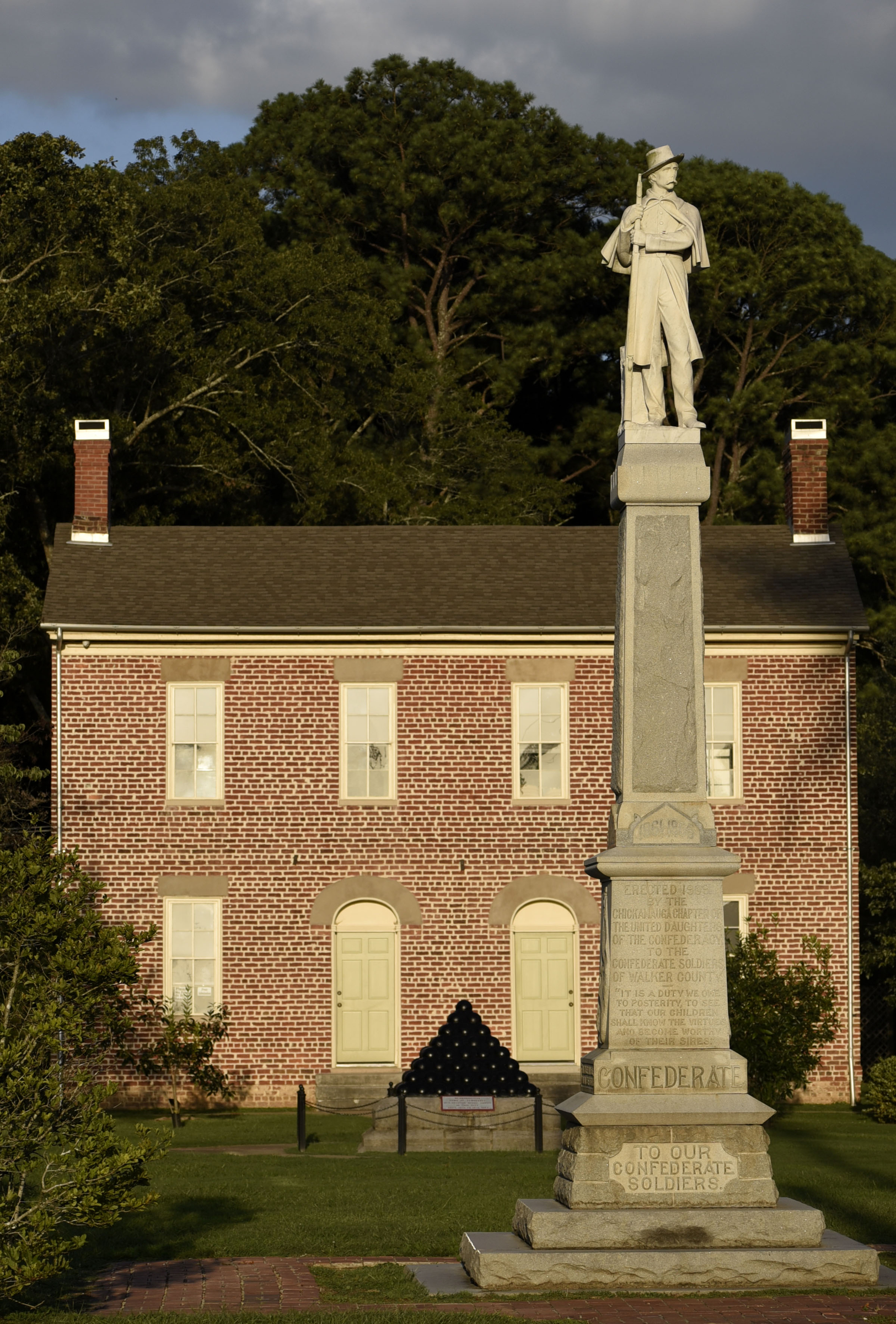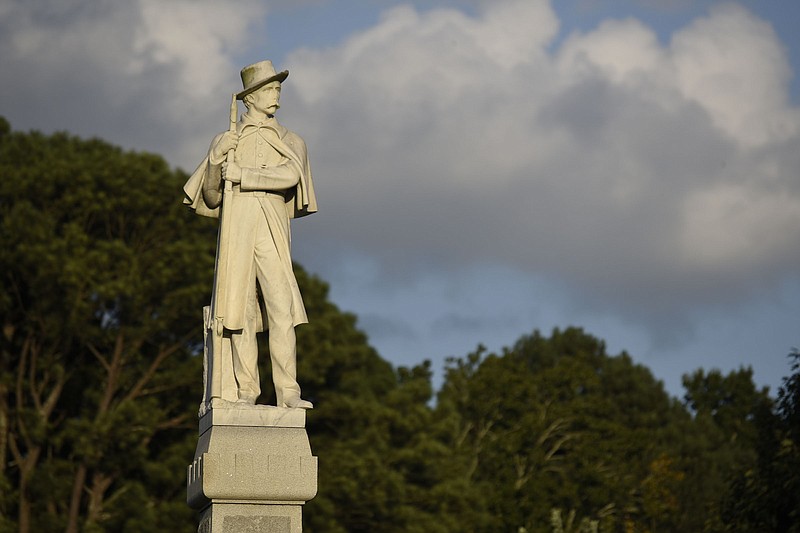 Staff Photo by Robin Rudd A monument to the Confederate Soldiers of Walker County, Georgia stands in front of the Historic Chattooga Academy in LaFayette on August 17, 2017. The monument was erected by the United Daughters of the Confederacy in 1909. Chattooga Academy served as Confederate Gen. Braxton Bragg's headquarters from September 10-17, 1863. The pyramid build with cannonballs, in the background, is a National Park Service monument that marks the location of Bragg's headquarters before the Battle of Chickmauga.
Staff Photo by Robin Rudd A monument to the Confederate Soldiers of Walker County, Georgia stands in front of the Historic Chattooga Academy in LaFayette on August 17, 2017. The monument was erected by the United Daughters of the Confederacy in 1909. Chattooga Academy served as Confederate Gen. Braxton Bragg's headquarters from September 10-17, 1863. The pyramid build with cannonballs, in the background, is a National Park Service monument that marks the location of Bragg's headquarters before the Battle of Chickmauga.After rejecting a request to give local governments more control, the Georgia Senate adopted Sen. Jeff Mullis' monuments protection bill Tuesday afternoon.
Mullis, R-Chickamauga, has sold the legislation as a way to more thoroughly protect historical structures such as statutes and plaques. The bill extends to military, religious or cultural monuments, and it gives local governments the ability to sue vandals for treble damages, which allow a judge or jury to order the culprit to pay three times the actual cost of the damage.
"This bill allows our history to be preserved," Mullis said. "It's that simple."
But Senate Democrats have balked at language at the end of the bill, which they say specifically protects controversial Confederate monuments - even in communities where residents have urged for their removal.
Mullis' bill says that a government cannot move a monument to a less prominent location. If they are outside, the government cannot move them inside, specifically to a museum. Some Democrats have argued that museums are the appropriate place for Confederate monuments and would allow workers to put them in context, such as alongside a display on the history of slavery or the events that led to the Civil War.
State Sen. Elena Parent, D-Atlanta, sponsored a conflicting bill this year. Her legislation would shift control of the monuments from the state government to local governments.
In her district, residents have rallied to remove a 30-foot-tall obelisk from a Decatur city square. Erected in 1908, the obelisk celebrates members of the Confederacy as a "covenant-keeping race." The DeKalb County Commission voted in October 2017 to move the monument, but Parent said Tuesday that nobody else in the community wants it, including workers at the local cemetery.
She argued county commissions and city councils should be able to decide what to do with these structures.
"Maybe they don't all need to go," she said. "But I don't think they all need to stay, either."
Her bill has not emerged out of the Government Oversight Committee. She offered the legislation as an amendment attached to Mullis' bill Tuesday. Mullis said he opposed the amendment, and the Senate rejected it, 33-21. The chamber then passed Mullis' bill, 34-17.
Mullis said he was motivated by attacks on monuments in North Georgia. Last year, some vandals broke headstones and tore up flags in a Confederate monument in Ringgold.
Eleven years ago, someone tipped over and broke an obelisk that honors James Gordon, who helped settle Chickamauga after purchasing property in a Cherokee land lottery. Gordon owned a slave plantation and helped run a local mill. (Former City Manager John Culpepper said he does not think the vandals attacked Gordon's monument because of his status as a slave owner, given that unrelated headstones nearby also were damaged.)
With Crossover Day coming Thursday - generally, the last day to pass a bill out of its original chamber - Mullis needed to push the legislation through quickly. The Government Oversight Committee favorably reported his bill last week, 5-3, pushing it to the Senate floor.
On Tuesday, Mullis argued that people do not need to do away with monuments; they simply need to add more with different points of view. He fears people will forget the country's history otherwise. He believes the structures need to stay in prominent locations instead of "hidden behind a group of trees or covered with a blanket."
But NAACP DeKalb County Branch President Teresa Hardy said the legislation is a negative step for her community. In partnership with local politicians, members of her organization have pushed for years to gain the authority to remove the obelisk in Decatur. She said Mullis' bill only makes their job more difficult.
"We asked for local control to have it removed off public property," she said. "No one wanted it. If you want to protect it, find its own place."
Before passing the bill, the Senate adopted two amendments. One adds specific protection to civil rights monuments. The other amendment allows local governments to add plaques to the monuments, providing the back story to the structure. Mullis said current law already allows for those types of signs.
The bill now will go to the state House.
Contact staff writer Tyler Jett at 423-757-6476 or tjett@timesfreepress.com. Follow him on Twitter @LetsJett.
